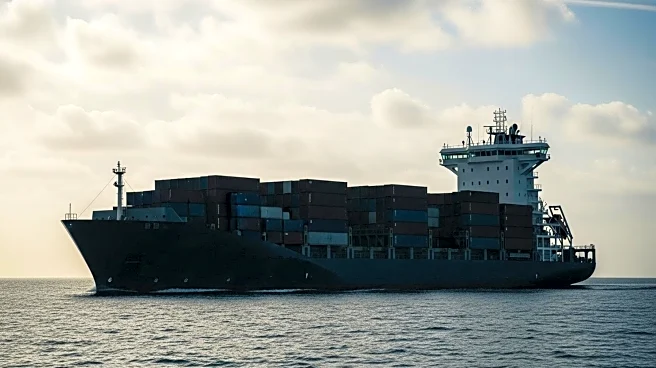What's Happening?
The National Retail Federation (NRF) and Hackett Associates have forecasted a 3.4% decline in cargo volumes for 2025 compared to the previous year. This prediction comes despite near-record imports in July, as companies attempted to stockpile goods ahead of tariff increases. The NRF Global Port Tracker anticipates continued year-over-year declines in cargo volumes from August 2025 through January 2026. Jonathan Gold, VP for Supply Chain and Customs Policy at the NRF, highlighted the challenges posed by reciprocal tariffs, which have increased costs and complicated long-term planning for retailers. A federal appeals court recently ruled against President Trump's use of the International Emergency Economic Powers Act to impose tariffs, although the tariffs remain in place pending a Supreme Court appeal. Additionally, President Trump has delayed an increase in China tariffs and imposed a new 25% tariff on India.
Why It's Important?
The forecasted decline in imports is significant for U.S. retailers, as it suggests ongoing challenges in managing supply chains amid tariff uncertainties. Higher tariffs have led to increased costs, which are likely to result in higher prices for American consumers. The uncertainty surrounding U.S. trade policy complicates strategic planning for businesses, potentially affecting their competitiveness and profitability. The impact of tariffs on trade is evident in the pessimistic outlook for the remainder of the year, as noted by Ben Hackett of Hackett Associates. This situation underscores the broader economic implications of trade policy decisions and their effects on consumer markets.
What's Next?
As the tariffs remain under appeal to the Supreme Court, the outcome of this legal process could have significant implications for future trade policy and economic conditions. Retailers and other stakeholders will be closely monitoring developments, as changes in tariff policies could alter the current trajectory of import volumes and associated costs. The delay in increasing China tariffs and the new tariffs on India may also influence trade dynamics and business strategies in the coming months.
Beyond the Headlines
The ongoing tariff disputes highlight the complex interplay between international trade policies and domestic economic conditions. The legal challenges to President Trump's tariff impositions reflect broader debates about the use of executive powers in trade matters. Additionally, the situation raises questions about the long-term sustainability of current trade practices and their impact on global supply chains.









